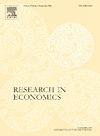The intergenerational transmission of health during childhood
IF 1.3
Q3 ECONOMICS
引用次数: 0
Abstract
Health during childhood is a key determinant of future outcomes. However, some children start life in an unfavourable situation just because of their family inheritance. This study analyses mother's health effect on their offspring's health aged 0–12 years, and the interaction between mothers’ health and education in the child's health production. By using an original instrument and applying an endogenous multivariate probit to the last two “Enquêtes Camerounaises Auprès des Ménages” (ECAM 3 and 4), the study reveals an intergenerational transmission of health during childhood life and the complementarity of mothers' health and educational capital in the production of health for their children. Although inequalities in health decrease with the mother's educational level, there are thresholds beyond which this effect fade due to the potential excessive participation of women in the labour market. The fall in this phenomenon in the older cohort (6 to 12 years) reveals the importance for the most educated mothers to make a more altruistic trade-off between economic work and childcare in the first five years of their offspring's lives. However, the self-assessed use of healthcare by children reported by parents could be a limitation inherent to the quality of the data used in the Cameroonian context.
童年期健康的代际传递
儿童时期的健康状况是决定未来结果的关键因素。然而,有些孩子仅仅因为他们的家庭遗传而在不利的情况下开始生活。本研究分析了母亲健康对0 ~ 12岁子代健康的影响,以及母亲健康与教育在子代健康生产中的交互作用。通过使用一种原始工具,并对最后两个“ Enquêtes Camerounaises aupr des msamnages ” (ECAM 3和4)应用一种内生的多变量概率,该研究揭示了儿童时期健康的代际传递,以及母亲的健康和教育资本在为子女提供健康方面的互补性。虽然健康方面的不平等随着母亲受教育程度的提高而减少,但由于妇女可能过度参与劳动力市场,超过一定的阈值,这种影响就会消失。这一现象在年龄较大的年龄组(6至12岁)中有所下降,这表明受教育程度最高的母亲在子女出生后的头5年里,在经济工作和照顾孩子之间做出更无私的权衡是很重要的。然而,父母报告的儿童对医疗保健使用情况的自我评估可能是喀麦隆所使用数据质量固有的限制。
本文章由计算机程序翻译,如有差异,请以英文原文为准。
求助全文
约1分钟内获得全文
求助全文
来源期刊

Research in Economics
ECONOMICS-
CiteScore
1.40
自引率
0.00%
发文量
37
审稿时长
89 days
期刊介绍:
Established in 1947, Research in Economics is one of the oldest general-interest economics journals in the world and the main one among those based in Italy. The purpose of the journal is to select original theoretical and empirical articles that will have high impact on the debate in the social sciences; since 1947, it has published important research contributions on a wide range of topics. A summary of our editorial policy is this: the editors make a preliminary assessment of whether the results of a paper, if correct, are worth publishing. If so one of the associate editors reviews the paper: from the reviewer we expect to learn if the paper is understandable and coherent and - within reasonable bounds - the results are correct. We believe that long lags in publication and multiple demands for revision simply slow scientific progress. Our goal is to provide you a definitive answer within one month of submission. We give the editors one week to judge the overall contribution and if acceptable send your paper to an associate editor. We expect the associate editor to provide a more detailed evaluation within three weeks so that the editors can make a final decision before the month expires. In the (rare) case of a revision we allow four months and in the case of conditional acceptance we allow two months to submit the final version. In both cases we expect a cover letter explaining how you met the requirements. For conditional acceptance the editors will verify that the requirements were met. In the case of revision the original associate editor will do so. If the revision cannot be at least conditionally accepted it is rejected: there is no second revision.
 求助内容:
求助内容: 应助结果提醒方式:
应助结果提醒方式:


